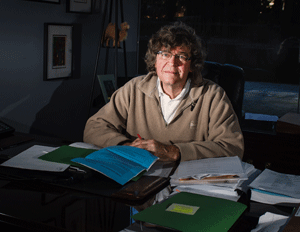
The Ontario court of Appeal has set aside a possession of guns and drugs conviction after finding the Crown used inappropriate tactics to question a defence witness.

During a break from cross-examining a key defence witness, the Crown attorney made a long distance call in the courtroom to verify the witness's claim with her family member in India, a man named Parminder. The call was placed on speakerphone, and the family member could be heard contradicting the witness's evidence.
"Crown counsel spoke in a loud voice, as though he wanted everyone in the courtroom to hear the conversation. Both sides of the conversation were, in fact, clearly audible to everyone present," said appeal court Justice George Strathy.
Once the cross-examinations resumed, the Crown used information from the telephone call and asked the witness if anyone had told her about the call he had just made and what was said.
"In my view, the Crown's telephone call to Parminder, in the courtroom with spectators present, was improper. So was the manner in which the Crown used the information obtained on the phone call," said Strathy, who wrote on behalf of a unanimous panel. "The reasonable inference is that he made the call, in public, in the courtroom, on a speaker phone, in a loud voice, so that word of Parminder's denials would get back to the witness...through one of the spectators."
Strathy said the phone call was "a deliberate ploy" to influence the witness's evidence in the middle of cross-examinations through communication that wasn't part of the record. "It was entirely improper," said the judge, who set aside the conviction and ordered a new trial.
The cross-examination, and the hearsay evidence the Crown introduced, might have affected the jury's perception and verdict, according to Strathy. "Examined in the context of the whole trial, and taken together with the improper cross-examination of the appellant, the Crown's conduct was sufficiently prejudicial that it deprived the appellant of a fair trial," he said.
Added Strathy: "It may well be that through inexperience or overzealousness or both the Crown 'momentarily lost sight of his obligations,' in the words of Cory J. in Logiancco."
The appeal court also took issue with the way Crown counsel cross examined the accused, Bickramjit Dhaliwal, finding that he was improperly asked to explain the charges against him. Dhaliwal was accused of planting weapons and drugs in his nephew's house and car, and calling police anonymously to report the weapons. Dhaliwal denied the charges. His sister, the defence witness on the stand, testified that a third family member, Parminder, had phoned to warn her the nephew had weapons and was coming after her and her brother Dhaliwal.
Last week, the appeal court head another case where the Crown's line of questioning was deemed improper both by the trial judge and the appeal court, but a retrial wasn't ordered in that case. In R. v. John, the Crown suggested during cross-examination that the accused could have called a witness to verify his claim, an assertion the court said shifted the onus of proof on the accused.
Criminal lawyer James Lockyer represented the appellants in both John and Dhaliwal. He says in his experience, “there’s a significant problem with Crown attorneys going outside the rules of prosecution.”
In John, the trial judge asked the jury to disregard that line of questioning, a measure deemed sufficient by the court of appeal to erase the effect of the Crown’s improper questioning.
“More often than not, the court of appeal and the trial courts say that they can correct what the Crown has done wrong by instructing the jury, and I must say I find that unsatisfactory in most cases,” Lockyer says.
Criminal lawyer Daniel Brown agrees with Lockyer. “When you read the conduct in the John case, you say, ‘This is even worse than what happened in the Dhaliwal case,’” he says.
“So it’s kind of puzzling to understand how in one case the court of appeal says this improper cross-examination might have affected the jury verdict and in another case [says] the jury is capable of following the judge’s instruction and the judge’s instruction was enough to resolve the issue.”
"No instruction to the jury could cure the types of problems raised in these cases."
Update: James Lockyer comments added at 2:20 p.m.